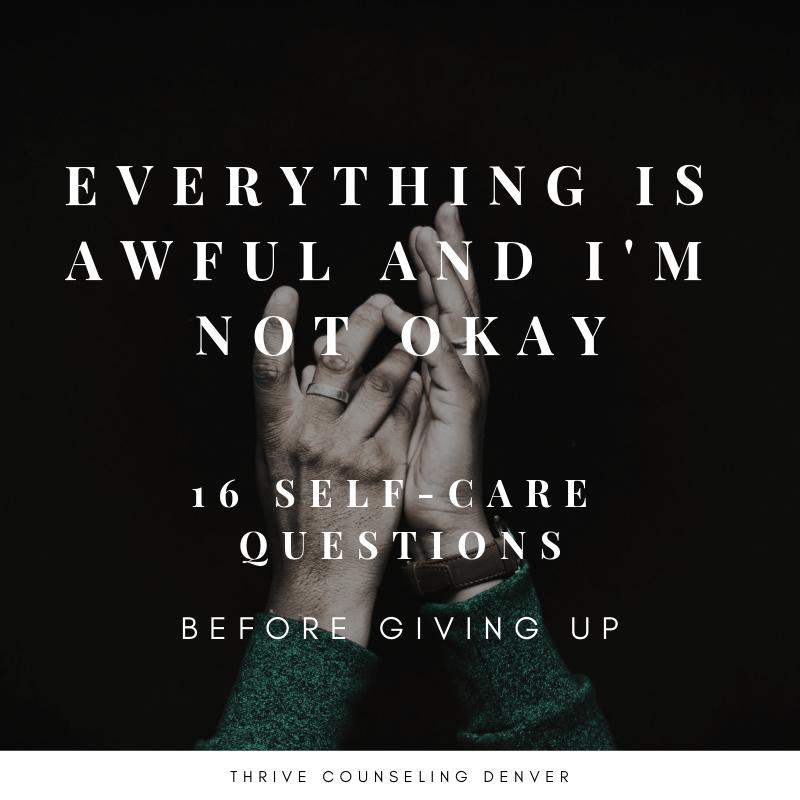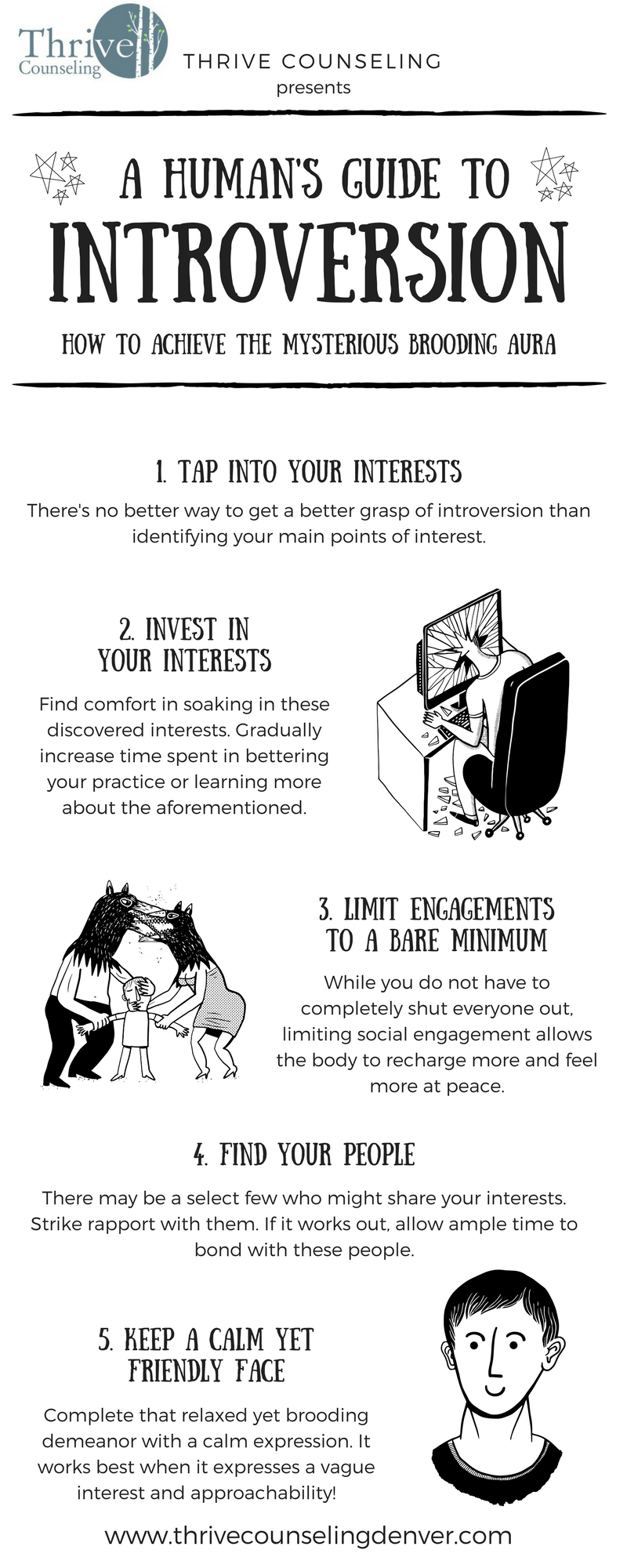
Do You Ever Feel Like a Fraud? Yeah, me too.
Ever feel like a fraud at work or with friends? Yeah, me too. That’s called Imposter Syndrome and it’s really common.

Ever feel like a fraud at work or with friends? Yeah, me too. That’s called Imposter Syndrome and it’s really common.

When you really want to make changes, meet your goals, improve your relationships or resolve nagging issues, research shows that the most important thing to make therapy or counseling effective is something call “goodness of fit.” That’s a Psychology term for how well you and your therapist ‘click’ together. You know what it feels like when you ‘click’ with someone. Like when you first met your best friend, or your future spouse. It’s this amazing moment of things “oh, here’s my person!” Another to put this is that if you feel that your therapist “gets” you and you feel safe opening up to them and comfortable being vulnerable (which is essential to make changes and meet goals in counseling). So how do you find this magical person? The good news is that there are a plethora of great therapists in Denver. The bad news is that there are a plethora of therapists in Denver, and that can be overwhelming. It can be really, really difficult to find a great fit, but here’s some tips to make the process easier: Narrow Down your Criteria It’s more than okay to have preferences (and ‘must-haves’) for a therapist you are considering working with. You may prefer someone older (or younger), or a man versus a woman. You may look for someone with a particular background (like someone that’s a parent, or is trained in a specific type of therapy). Make a small list of your preferences as a jumping-off point. Make it easy on yourself Counseling is hard enough; you’re sitting in a room with a stranger, baring your secrets and really getting into the nitty-gritty of your ‘stuff.’ So you want to make it easy on yourself in terms of logistics. Check to see if the therapist you’re eyeing has time slots that work for you in an ongoing way. Check their office location to make sure you can easily get there (and park! as we all know, parking can be a nightmare in Denver). Does the office look comfortable and relaxing? There’s lots of great office space available all over Denver, no need to sit in a dark, cramped office. Probably most importantly; can you afford it or does this therapist work with your insurance plan? If you’re going to be stressed about the investment of the counseling in the first place, it doesn’t set you up well to reach your goals. Therapist’s fees should be very clearly stated on their website (if they aren’t, then give it a pass), as well as clear language about whether they take insurance or not. If they don’t take your insurance, ask the therapist about how they can assist you in being reimbursed by your insurance company by submitting paperwork on your behalf (most insurance plans do cover counseling in one way or another, and your therapist should help you navigate this). We do this at Thrive Counseling as a service to our clients, and they say it’s been incredibly helpful in budgeting and making sure that the investment in therapy counts towards their deductible (if they have one). Ask The Right Questions During that first phone call or in-person meeting, the therapist will be asking you a lot of questions; about you, how you have been feeling, what your goals are, where you’ve been getting stuck or hurting, etc. But in a good consultation, you should also be invited and encouraged to ask questions. This is your opportunity to “interview” for the job of being your therapist (a very important role!). So grab that opportunity to ask the right questions to really see if this therapist is the one for you. Here’s some ideas to get your started: Do you help clients like me? How do you help them? What are some examples of tools, strategies or techniques you think would be helpful for me? How do you measure progress with your clients? Do you write a treatment plan and when do we go over it together? What’s your experience in helping people with my specific issue? Make The First Move Now it’s time to act. There’s no getting around it; you have to make that call, send that email, or click the Contact Us button on the website. To get what you’ve never gotten, you have to do what you’ve never done. Maybe for you that’s being vulnerable. Maybe it’s letting a professional evaluate your life-long anxiety, or voice those deep, dark and depressing thoughts. Maybe it’s entertaining the idea that you’re worth it; you’re worth putting in the effort to heal. Maybe it’s asking for help in leaving a bad relationship, or becoming a better you to finally find that right relationship. Whatever it is for you, we are cheering you on. Whether that’s with us at Thrive Counseling, or elsewhere. We want you to get where you’re going. We’d love to help. Contact Us for a free consultation.

When everything is awful and you are not okay, you probably feel like giving up. That’s normal, that’s human, and we’ve all been there. But before you give up (whatever that means for you) here are 16 questions to ask yourself: Are you hydrated? If not, have a glass of water. Have you eaten in the past three hours? If not, get some food — something with protein, not just simple carbs. Perhaps some nuts or hummus? Have you showered in the past day? If not, take a shower right now. If daytime: are you dressed? If not, put on clean clothes that aren’t pajamas. Give yourself permission to wear something special, whether it’s a funny t-shirt or a pretty dress. If nighttime: are you sleepy and fatigued but resisting going to sleep? Put on pajamas, make yourself cozy in bed with a teddy bear and the sound of falling rain, and close your eyes for fifteen minutes — no electronic screens allowed. If you’re still awake after that, you can get up again; no pressure. Have you stretched your legs in the past day? If not, do so right now. If you don’t have the spoons for a run or trip to the gym, just walk around the block, then keep walking as long as you please. If the weather’s crap, drive to a big box store (e.g. Target) and go on a brisk walk through the aisles you normally skip. Have you said something nice to someone in the past day? Do so, whether online or in person. Make it genuine; wait until you see something really wonderful about someone, and tell them about it. Have you moved your body to music in the past day? If not, do so — jog for the length of an EDM song at your favorite BPM, or just dance around the room for the length of an upbeat song. Have you cuddled a living being in the past two days? If not, do so. Don’t be afraid to ask for hugs from friends or friends’ pets. Most of them will enjoy the cuddles too; you’re not imposing on them. Do you feel ineffective? Pause right now and get something small completed, whether it’s responding to an e-mail, loading up the dishwasher, or packing your gym bag for your next trip. Good job! Do you feel unattractive? Take a goddamn selfie. Your friends will remind you how great you look, and you’ll fight society’s restrictions on what beauty can look like. Do you feel paralyzed by indecision? Give yourself ten minutes to sit back and figure out a game plan for the day. If a particular decision or problem is still being a roadblock, simply set it aside for now, and pick something else that seems doable. Right now, the important part is to break through that stasis, even if it means doing something trivial. Have you seen a therapist in the past few days? If not, hang on until your next therapy visit and talk through things then. Have you been over-exerting yourself lately — physically, emotionally, socially, or intellectually? That can take a toll that lingers for days. Give yourself a break in that area, whether it’s physical rest, taking time alone, or relaxing with some silly entertainment. Have you changed any of your medications in the past couple of weeks, including skipped doses or a change in generic prescription brand? That may be screwing with your head. Give things a few days, then talk to your doctor if it doesn’t settle down. Have you waited a week? Sometimes our perception of life is skewed, and we can’t even tell that we’re not thinking clearly, and there’s no obvious external cause. It happens. Keep yourself going for a full week, whatever it takes, and see if you still feel the same way then. You’ve made it this far, and you will make it through. You are stronger than you think. This post is licensed under a Creative Commons Attribution 4.0 International License: alteration and redistribution are welcome

Millennials have been recently dubbed ‘Generation Rent’, due to the price of housing far outstripped both inflation and wage growth. Most young adults can’t afford to buy their own place (even if they wanted to), and so are ‘stuck’ renting a house or apartment. Rents in Denver are high; that’s not a surprise to anyone who has apartment-hunted recently. A recent report showed that between 2010 and 2017 average rents in Denver shot up an astronomical 48 percent. The median rent in Denver for a one-bedroom apartment is now almost $1,400. Although there are positive to renting, such as flexibility in moving and not having to worry about fixing your own leaking faucet, when rents keep rising it can have an effect on your mental health. How? Frequent Moves lead to More Stress When you’re renting, especially in Denver where rent hikes force more moving than average, it’s hard to find a sense of stability and community. Moving itself is stressful and expensive, and keeps people from investing in their homes and making their space their own. In an ideal world, your home is your safe space; a place to de-stress after a long day at work. But many renters feel that their space is not really ‘theirs’ and don’t make changes to it to make it a more calming space, like painting the walls or buying a new bathtub to soak in. Additionally, having a sense of community and knowing your neighbors is generally good for your mental health. If you’re moving around a lot, it’s very hard to develop that sense of community and have neighbors that you can count on to borrow a cup of sugar or watch your car while you’re away. In fact, a study recently found that, compared to homeowners, young renters are more likely to experience loneliness and mental health issues. Money Stress Impacts Mental Health Housing is, by far, most people’s largest expense. In pricey areas like Denver, housing far outpaces other bills. It’s well-known that experiencing financial insecurity leads to increased anxiety, depression, and a general feeling of being ‘left behind’ by peers who appear more financially stable. Even among Denver renters who can pay the bills, knowing that an emergency might cause a problem with making rent leads to increased stress. Add to that the fact that renters face the unknown more than homeowners; they don’t know what the rent will be next year. It’s been rising for over a decade, so it’s just a matter of “how much more will it be next year?” and “can I afford that or do I need to move again?” Leaving Support Networks Leads to Isolation and Loneliness When renters have to move, they inevitably leave behind the built-in social networks and support systems that they cultivated in their old hoods. Having friends and family nearby is protective of mental health. Even knowing your favorite cafes and spots for take-out is comforting. Moving away from all of that due to rising rents can feel very isolating and de-stabilizing. Feeling Like you Can’t Reach Life Goals Housing costs, and the instability of renting, can have an impact on people’s life choices; even large life choices. Housing costs is affecting how people weigh whether to enroll in graduate school and whether (or when) they have children. Even smaller life goals, such has having a space for woodworking, hosting large dinner parties for friends, or mowing your own yard, can feel very far away when housing costs are so high and people feel stuck renting a home they don’t love. In Denver, it’s easy for young adults to feel like they can’t ‘grow up’ and make informed decisions about their life, career, and family until they feel rooted in their own home.

Anxiety is a normal, common human emotion that everyone feels at some point or another. It’s normal to feel nervous or anxious when faced with certain situations. Common examples are public speaking, a mysterious meeting with your boss, meeting a new roommate, or going on a first date. It’s also normal and healthy to feel anxious in situations that are perceived as unsafe or a little risky. I always feel a little rush of anxiety on a ski lift, even though I’ve been snowboarding for years and know how to get off the lift without falling. A friend of mind always feels a bit nervous flying on airplanes, even though she does it a lot and has never had a bad experience on an airplane. Anxiety is an emotion that serves an important purpose. When our brains sense a possible danger in our environment (even if it’s one we imagine in our mind’s eye), we experience a feeling of anxiety that triggers a cascade of bodily functions that are meant to get us to pay closer attention to what comes next, and be ready to respond to anything. So during a feeling of anxiety, you may notice your heart rate increases (to pump more blood to your muscles in case you need to move quickly and your pupils dilate (to see a bit better and respond to movement in your field of vision). So anxiety is not bad; it’s a good thing that’s developed over a long time to keep you safe. But when does a ‘normal’ experience of anxiety morph into a problem or a possible Anxiety Disorder? A normal experience of anxiety has 3 parts: -The anxiety is short-lived -The anxiety correlates well to the situation that triggered it -The anxiety doesn’t stop you from living your life With a normal level of anxiety, it comes and goes and doesn’t seem to last all day long. Also, the anxiety that you feel will ‘fit’ with the situation and will pass once that situation is over or once you feel more comfortable. For example, you may feel anxiety right before you give a big presentation at work, but feel calm after it’s over or once you get going with the presentation and feel more comfortable. And finally, the anxiety does not stop you from fully engaging with your life, both professionally and personally. By contrast, a clinical level of anxiety or a full-blown Anxiety Disorder has these features: -The anxiety is long-lasting or seems always present -The anxiety does not correlate to a specific situation -The anxiety gets in the way of personal and professional goals and tasks Anxiety disorders are relatively common, affecting about 18% of the adult population in the US. The most common feature that our clients describe about their anxiety is that it’s an ever-present kind of shadow of their lives. Over time, it can encroach more and more on your day-to-day life. For example, anxiety might stop you from doing an important work presentation or interviewing for a new job. It may lessen your social life or make it difficult to hang out with friends. If you feel your anxiety has progressed past a normal level and into more of a problem, reach out to Contact Us and get a free consultation. Working with a counselor to reduce your anxiety will help you feel calmer and more at peace on a daily basis.

Our friends over at Therapy Den recently wrote a great post about how to find a good therapist. Check it out and be persistent util you find the right therapist for you!

4 sneaky signs of depression you might be overlooking Depression is a very common mental health issue. At any given time, estimates are that 5-6% of adults in the US have Depression or are in a Depressive Episode (which is a period of time that someone experiences Depression). The traditional and most obvious signs of depression are pretty well known, and those include: Feeling sad most of the day Crying spells Feeling ‘down’ and hopeless Suicidal thoughts (sometimes, some people do not experience this in Depression) But there are some other signs of Depression that are easy to miss, and may fly under-the-radar. Feeling ‘Slowed Down’ both Physically and Mentally A feeling of being ‘slowed down’ is really common for people experiencing Depression. Clients often say that they feel like are moving in slow motion, or feel like they are stuck in quicksand. It’s not only physical, but mental too. When you’re in a period of Depression, it feels like your brain is also slowed down. It’s common to feel not as ‘sharp’ as usual, or have difficulty remembering things. In cases of severe Depression, others might notice that ever your speech is a little slowed down. Sometimes it’s referred to as “brain fog” or people feel that they are perpetually in a haze. The good news is that, as Depression is treated, these symptoms go away and you begin to think and feel more like your normal self. Sleeping Too Much Sleep in great, and often we don’t get enough of it. But when in a Depressive episode, one sneaky sign is sleeping too much. This means sleeping much more than you usually would. If you notice yourself sleeping more, or taking naps when you never did before, it could be a sign of Depression. If you’re not sure whether your sleep is a sign of Depression, here are some helpful things to do: Keep a Sleep Log so you can notice trends in your sleep Evaluate your diet to make sure you are eating enough and eating well to give yourself energy; tiredness could be due to a poor diet Keep an alarm and get out of bed at the same time each day, to get your body into a healthy sleeping rhythm Consider cutting out alcohol for a few weeks to see if your sleep improves; alcohol can cause sleepiness and disrupt natural sleep patterns. If you do all these things and still are over-sleeping, get an evaluation by a therapist for Depression. Not Enjoying Things Anymore A very common sign of depression that is sometimes hard detect is call anhedonia. That’s the clinical term for losing interest and pleasure in every day activities. It’s a kind of grayness that settles over your whole life. Things you used to enjoy like your favorite foods, spending time with friends, activities and hobbies, even sex, just seem kind of ‘blah.’ You feel like you would take it or leave it. Researchers believe that a Depressed brain is not responding in the normal way to pleasurable stimuli. It’s a terrible feeling, to be in your life and simply not enjoying anything. The insidious thing about anhedonia is that is creates a vicious cycle in the Depressed person. Since you aren’t’ enjoying these things, you’re less likely to do them (which makes sense). But a result is that people in the grips of Depression begin to retreat from the world and from their lives. They lose friendships and lose touch with activities and hobbies that they used to care about. You get farther and farther from ‘who I am’ and Depression can become a kind of identity. This symptom does vastly improve with Depression treatment, and people re-enter their lives and do things again. But this sign is often overlooked. If you’re finding yourself feeling very ‘blah’ about your life, be curious about that and talk to a therapist about these feelings. Poor Attention Span Similar to the ‘slowed down’ feeling in your brain with depression, another cognitive effect is having a poor attention span. Depression affects the parts of your brain that control what’s called ‘executive functions.’ The executive functions of the brain are things like organizing information, prioritizing tasks, creating an order for doing things, and paying attention to important stimuli. For reasons that researchers don’t quite understand, these executive functions take a big hit during a Depressive episode. The one that’s easiest to ‘see’ on the outside is attention. We can all get distracted, and we live in an environment where is it very hard to concentrate. But if Depression is present, you may notice your attention space take a dive. It’s harder to complete tasks at work, or watch a movie, or even have a conversation without getting distracted or losing the thread of the plot or the conversation. If any of these sneaky Depression signs are creeping up on you, pay attention and check in with yourself. You may want to get an evaluate for clinical Depression. Depression is very treatable, and the sooner you catch it the easier it is to get back to being yourself. Contact Us anytime for a free consultation.

It’s been a building trend, but it’s definitely here. Colorado and Denver residents are not happy that we’re among the leaders in the nation for suicide. Overall, the Mountain States lead the entire country in suicide. According to the Colorado Health Institute, Colorado’s suicide rate reached an all-time high in 2016, and it hasn’t retreated much since then. In 2016 a record 1,156 people died tragically to suicide. Suicide is most common in the age group of 24-55 year-olds, and men are twice as likely to die by suicide as women are (although there is evidence that women feel suicidal at the same rate as men, and are just as likely to make an attempt or a gesture at suicide). What is really alarming is that the leading cause of death for Coloradans aged 10 to 24 is suicide. That’s right, suicide beats out illness and accidents as the leading cause of death. Colorado has the ninth-highest suicide rate in the entire country, coming in at 20.5 suicides per 100,000 residents. And how does Denver and the surrounding area stack up the with rest of the state? It’s about in the middle. The suicide rate for Denver county and the surrounding metro area ranges from 16.8-17.5 deaths per 100,000 residents. By contrast, the highest suicide rate is Mesa County, with 34.7 suicides per 100,000 residents. The Eastern part of the state and the Mountain counties like Eagle and Pitkin have a lower suicide rate than Denver. In our counseling office, clients speak openly about thoughts of suicide, and what is means to them. One very common factor in people that attempt suicide is that they feel incredibly alone and isolated. Many are scared to tell loved ones that they feel this way. They often feel embarrassed or ashamed of their feelings and thoughts, even though it’s very common to go through a period in your life of entertaining the thought of suicide, especially if you are dealing with depression, anxiety, loss or hopelessness. In counseling, often clients are able to open up for the first time about these thoughts and feelings, get real help, and move past these thoughts towards hope and feeling invested in their lives again. It’s amazing how just saying the words out loud of what you really think and feel can take away the loneliness, hopelessness, and shame of feeling suicidal. Since suicide is such an issue in Denver and Colorado, there are resources for anyone to access (counseling, hotlines, walk-in clinics, and other resources). Even if you feel like you might not be in a crisis, reaching out for help before you are in an emergency is important, and people are standing by to help. Here’s some resources for the Denver Area: If you are in crisis, call the Colorado Crisis & Support Line at 1-844-493-TALK (8255) to connect with a trained counselor in your area. Or reach the toll-free National Suicide Prevention Lifeline at 1-800-273-TALK (8255) 24 hours a day, 7 days a week. The service is available to anyone. All calls are confidential. There are Walk-In clinics scattered throughout the Denver Metro Area that are open 24/7 if you want to talk to someone in person. Find them at www.coloradocrisisservices.org. And as always, you can Contact Us here at Thrive Counseling. We’re here to listen.

Let’s face it: It’s really hard to make friends after college I remember making insta-friends in High School and College. It seemed so easy back then, didn’t it? You were thrown together with people your own age with generally few time commitments. You serendipitously run into your friends on campus, in classrooms, or at parties. It really seemed like everyone was in the same boat and was so relatable. Then you graduate and it gets so much harder to make (and keep) deep and satisfying friendships. Why is that and what can we do about it? “I’m just so busy right now!” One reason that it’s more difficult to make new friends and keep old ones is simply a fact of time (and its corollary, energy). It’s often a difficult transition to make the jump from a full-time student to a full-time worker; throw in a commute and possibly long hours as you begin to climb the corporate ladder and it’s even more of a wake-up call. Everyone you know would really love to hang out, but is just so busy. Creating time for friends takes effort and intention, and there no boss telling you to do it, so often it fades into the background. In addition, everyone needs some time to decompress from work and for the introverts of the world they want to do this alone. This is critical “me time” for mental health and self-care, but it does cut into would-be friend time. Life moves us in different directions As everyone grows older, their paths diverge in many different ways. People take different career paths, move to different cities and towns, get married, and have children (or not). All of this is healthy, and a part of making your own life. However, these paths may take you further away from old friends and make it more difficult to meet people that didn’t take the same path you did. “Growing apart” is a cliché in romantic relationships, but it’s a true one and it applies to friendships as well. With different life paths comes different experiences and oftentimes different worldviews, priorities, and preferences. If you feel you can’t relate to your friend anymore (and they to you), it’s difficult to put the effort into staying close and staying in touch. It’s vulnerable and awkward to meet new people Making a new friend is hard. One some level, you are saying to a new person “let’s hang out.” Since spontaneous interaction is harder to come by (people no longer just show up to the same parties weekend after weekend), you have to make a plan to meet up with someone. It can be uncomfortable and awkward to do so, because our culture tells us that we should magically be surrounded by friends at all times, and if we’re lonely for feel left out it’s because we did something wrong. On social media, people post most often that they are with other people, rather than alone. So it’s easy to feel like everyone has friends except for you. Matchmaking for Two Once people couple up, it can get even more difficult. You really want the respective boyfriends or girlfriends to get along, and sometime they just don’t hit it off. Making “couple friends” is even more tricky than making new friends in general. So if you’re significant other doesn’t hit it off with your new friend’s significant other, don’t sweat it. Make it a point to hang out one-on-one with our new pal. Getting Pickier As we get older, our priorities begin to shift away from novelty-seeking to towards security and stability. This differs from person to person, but overall, studies show that this gradual shift begins to happen in the late 20s. We tend to seek stability and enjoy security more and more, and we seek this out in our careers, where we live, who we date, and also who we cultivate as friends. All of this means that as we get older, we tend to get pickier about friends. New friends have a higher standard for us, and we tend to “prune” existing friendships; we tend to let fade away those friendships that aren’t as fulfilling to us. So, how do you make friends after college? Given that it’s more difficult to make friends after college, havng a few new strategies under your belt can help you find your new tribe Get involved in the activities your love-with others There’s meetup groups for every interest under the sun. If you’re into politics or activism, seek out your local political party chapter. Join a sports league is you love sports, a trivia league if you love arcane knowledge, join a homebrewing class if you’re into beer. You get the idea. If get yourself out there to participate in activities, at least you know that others are into that thing too, and you can go from there to create a new friendship. Don’t let your ego get in the way If you’re in a new city, or just looking to meet new friends, don’t feel ashamed of that and say so to others. It can feel awkward, but it’s ok to lead with some vulnerability here and state that you’re looking to meet new friends. Here’s a sample script you can use: I’m new in town and love soccer, so I joined this soccer league. Honestly, I’m looking for new friends to hang out with and I know this sounds kind of awkward, but would you like to grab a beer sometime with me? It’s okay to compartmentalize In High School and College, it’s normal to do everything with your friends. But as we all get older, have divergent interests and limited time, it’s ok for have friends for specific purposes or activities. You might have the friend you discuss books with, friends you go camping with, your co-worker friends for happy hour, and a workout friend. You’re not type-casting, your seeing how you connect with certain friends and

Everyone knows Denver loves the outdoors. For many, being outside in nature is calming, therapeutic, and acts as a ‘reset’ button after a stressful week. Recent studies suggest that being in nature is good for your brain. A Psychology Professor-and avid backpacker-at the University of Utah named David Strayer took 50 students on a 3-day Outward Bound camping trip and found they performed 50 percent better on cognitive tests than they did before they took the trip. So what might be happening? Strayer believes that being in nature allows important parts of the brain (notably the Prefrontal Cortex) to have the kind of rest they don’t normally get in our modern lives. The Prefrontal Cortex is the “command center” of the brain and it’s constantly evaluating and choosing actions, solving problems, and making decisions. If this sounds tiring, it’s because it is. The brain can get fatigued, and there’s something special about being in nature that gives it a chance to rest and rejuvenate. Another interesting study from researchers in England found that city dwellers who lived near open space (parks and open lands) reported less mental stress, even after adjusting for income, education level and physical health. A second study from the Netherlands found that people who lived within half a mile of green space had lower rates of 15 different diseases, including depression and anxiety. So getting out into nature actually does boost happiness. There’s a cultural knowledge about this. In Japan there is a term-shirin-yoku-that translates to Forest Bathing, which is an ancient practice of being near trees to boost health and wellness. We are lucky that living in Denver we are close to some of the most amazing nature in the country. If you need to find an amazing hiking spot, check out this list of 20 amazing day hikes near Denver. Get out and get some rejuvenation for your brain! all about wilderness therapy

Would it surprise you to know that most Therapists are Introverts? Check out our new Infographic on Introversion.

Have You Ever Wanted to Ask A Therapist a Question? Any question. Maybe about your boyfriend. Or your roommate. Or your family. Have you ever thought to yourself “Am I just weird? Or is this normal?” Lots of people have wondered these things, and really want an answer. But often they don’t know where to begin. It’s intimidating to think about talking to a therapist. And then there’s the steps involved in finding one that’s close to you, that will see you, and that you can relate to. And then there’s the question of money, which is very important. Therapy does cost money. The average session in Denver costs around $150. If you just have a question you want answered by an expert, that’s a lot of money to spend. So Thrive Counseling offers something most therapist practice don’t: A totally free consultation. “Consultation” is just a fancy word for a friendly meeting where you get to ask anything you want, and get an honest answer. Sometimes this leads to further sessions, but sometimes not. It all depends on what you need. If you’ve ever wanted a therapist’s ear, and would like this for free, contact us for a free consultation today. We have evening and weekend hours so you don’t need to disrupt your work schedule or miss out on walking your dog.